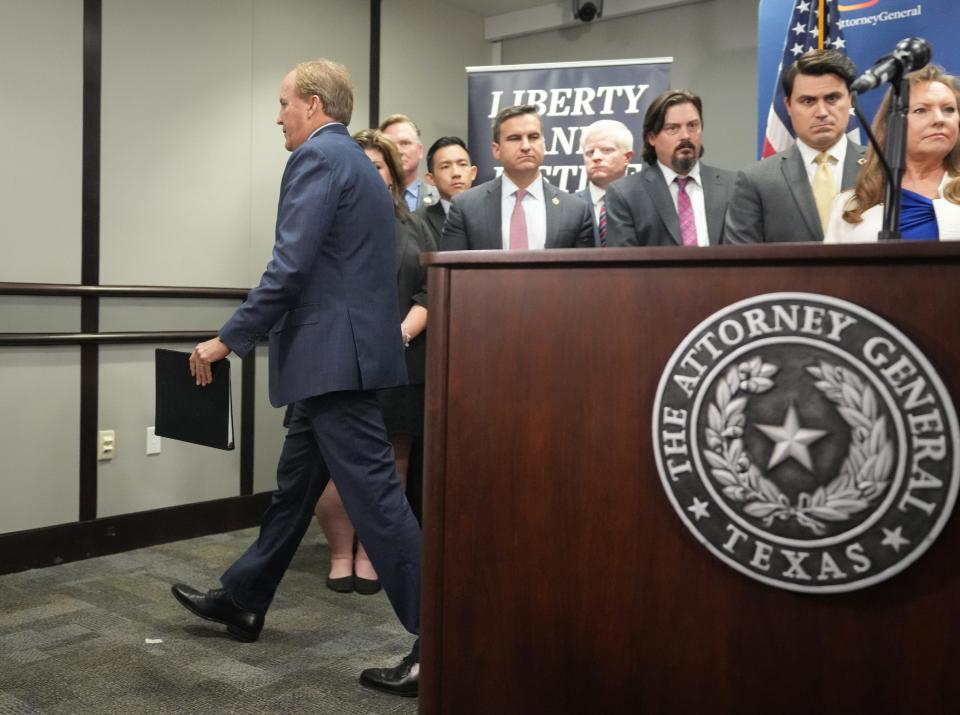By walking away from whistleblowers' suit, Ken Paxton keeps avoiding answering questions
- Oops!Something went wrong.Please try again later.
By saying he'll quit contesting allegations of corruption leveled against him by whistleblowers in a lawsuit, Texas Attorney General Ken Paxton sought to accomplish two things:
First, and perhaps most importantly, avoid — at least for now — having to publicly answer questions about the myriad accusations against him, which led to the Texas House impeaching him and ultimately the Texas Senate clearing him. And second, go back to calling his once-trusted top aides "rogue employees," political pawns and whatever else he wants.
Paxton filed a motion Thursday saying he no longer wants to continue his court fight. He didn't admit wrongdoing; he just said he wasn't going to argue the point. But the next day, Travis County state District Judge Jan Soifer set a Feb. 1 date for the attorney general to sit for a deposition in the case.
If Paxton is allowed to walk away from the case with no further legal proceedings, he could deny his political adversaries the potential opportunity to see him admit to wrongdoing or to plead the Fifth Amendment to avoid self-incrimination. At the same time, he's free to go back on the offensive and further cement his standing with the Texas GOP's conservative base.

Paxton's statement and the accompanying filing with the 250th District Court in Austin about him wanting to walk away from the long-running litigation contain no shortage of bombast aimed at the whistleblowers who leveled the accusations of possible criminal misconduct against him, including that Paxton used his office to help a political benefactor, and, in turn, that benefactor helped Paxton's alleged mistress get a job.
Paxton accused the whistleblowers of escalating a "crusade" against him and of seeking to "sabotage" his leadership as the state's top lawyer. But then, Paxton said in his recent motion that he "hereby elects not to contest any issue of fact in this case."
It's fair to ask why the three-term Republican is eager to fire broadsides against his adversaries on paper, but he is avoiding having to sit for questions from their lawyers, as the Texas Supreme Court ruled that Paxton would have to do if the litigation continues.
Paxton's official response, ostensibly, is that his walking away "precludes further unwarranted expense" to taxpayers for continued litigation and to have more time to file lawsuits and take other actions against the Democratic Biden administration.
Another plausible explanation is that answering questions under oath is a huge risk for anyone, but especially for a politician. If the whistleblowers' allegations are true, Paxton would have to admit to them in a deposition or perhaps on the witness stand. Or he could invoke the Fifth and stay mum. Neither would be a good look.
More: How Ken Paxton is seeking to extend the reach of his victory in the impeachment trial
Another option would be to follow the playbook of former President Donald Trump, a Paxton ally. In some of the sundry court actions taken against him, Trump admits to nothing and he counterattacks with bombast and gusto. As much as they might hate to admit it, the former president's adversaries understand that it has been a pretty darned effective strategy — at least for him.
Paxton has sought to emulate Trump in the past. Recall that after the Texas House voted to impeach him on charges that mirrored those of the whistleblowers, the attorney general went before reporters and TV cameras to offer a Trumpian defense, calling the Republican House members who brought the charges corrupt and politically motivated.
But once reporters tried to ask him questions, Paxton tucked his chin to his necktie and walked away without saying another word. During the Senate trial, Paxton's lawyers invoked Trump's catchall response to any allegations of wrongdoing made against him: "Witch hunt."
More: 'Worth every penny': AG Paxton impeachment cost more than $4 million
Paxton has the right to testify in his own defense, but he has chosen not to. In fact, he scarcely attended his impeachment trial — reportedly opting to get a massage at a high-end Austin spa and resort instead of sitting through the first full day of the hearing. And he left it to his lawyers to take reporters' questions after the Senate acquitted him on all impeachment charges.
If Soifer's Feb. 1 deposition order stands, questions will be asked of Paxton. And he'll be under oath. It's an open question whether he'll be playing offense or defense when, and if, that time comes.
This article originally appeared on Austin American-Statesman: Avoiding whistleblowers' questions has proven rewarding for Ken Paxton

